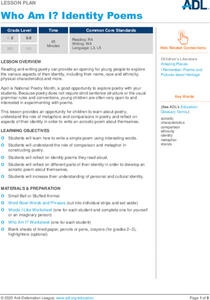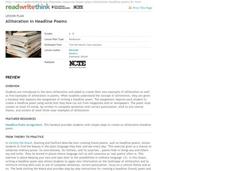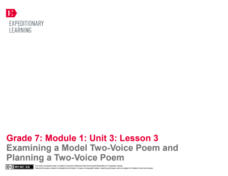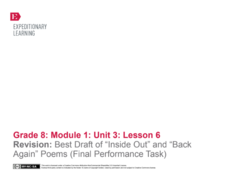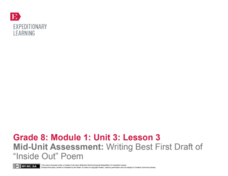National Council of Teachers of English
Writing Poetry with Rebus and Rhyme
Young scholars write rhyming poems using rebus. With pictures instead of words, authors create original work about things they love.
Geography 360°
Poetry Writing
Put the tips and tricks in this guide into practice in order to encourage your pupils to blossom into poets. A wonderful reference material for teachers, this packet includes definitions of poetic terms and forms as well as step-by-step...
DLTK
Writing Limericks
Scholars are lucky to stretch their poetry writing muscles with a activity that challenges them to compose two limericks—one about a boy and the other about a dog.
Hong Kong Special Administrative Region
Learning English through Poems and Songs
Exposing learners to the power of words in poetry is a stimulating way to learn languages. Songs, haikus, rhyming words, and narrative works are all employed in a resource for teaching English as a Second Language.
Scholastic
Writing An Acrostic
Invite learners to introduce themselves through poetry. After brainstorming and choosing details, pupils draft two acrostic poems using their names as the base. They then evaluate and revise their poems.
EngageNY
End of Unit Assessment: Writing Best First Draft of “Back Again” Poem
Team up! Scholars begin working with their research teams to review the components of an effective poem. They then move on to independent work by beginning the end-of-unit assessment. Writers complete the draft of their "Back Again"...
Poetry4kids
Onomatopoeia Poetry Lesson Plan
Two exercises boost scholars' knowledge of a onomatopoeia with excerpts from famous poems. In exercise one, participants circle onomatopoeia words. Exercise two challenges writers to choose three words to use in an original poem.
Poetry4kids
Personification Poetry Lesson Plan
Scholars take part in two exercises to boost their knowledge of personification. After reading a detailed description and excerpts from famous poems, writers list action verbs and objects then combine words to create a humorous...
EngageNY
Analyzing Poems from Inside Out and Back Again to Develop Criteria for an Effective Poem
Scholars analyze a model poem to help guide their poetry writing. They use Think-Pair-Share to discuss word choice and meaning in "Papaya Tree" and "Wet and Crying." To finish, they use their discussions to collect evidence on what makes...
Winterhill School
Poetry Analysis
Gain greater insight into poems using a poetry analysis worksheet. Here, scholars follow steps and answer questions to dissect any poem. Topics include the poem's meaning, theme, technique, and structure, as well as personal thoughts and...
Anti-Defamation League
Who Am I? Identity Poems
A lesson celebrating identity begins with a something-about-me activity, then moves on to writing favorite words. Class members then brainstorm metaphors and comparisons and read a poem to inspire their poetic abilities. Scholars craft...
ReadWriteThink
Alliteration in Headline Poems
Poetry is everywhere you look! Create found poems using headlines from newspapers and magazines. Young poetry focus on creating alliterative phrases with words they find in headlines, tying their poems to a central theme.
National Council of Teachers of English
Writing Acrostic Poems with Thematically Related Texts in the Content Areas
Scholars scour thematically aligned texts to gather a bank of words they can use in an original acrostic poem.
National Council of Teachers of English
A Bear of a Poem: Composing and Performing Found Poetry
Scholars work collaboratively to compose a found poem from one of their favorite stories. With a finished product in hand, class members form a circle and perform their work for an audience by taking turns reciting one line till the poem...
EngageNY
Examining a Model Two-Voice Poem and Planning a Two-Voice Poem
Successful poetry writing requires three P's: planning, preparation, and practice. Pupils read a model two-voice poem and discuss how the author uses evidence to develop the theme. With a partner, scholars use a rubric to analyze the...
Curated OER
Maniac Magee: Found Poem
Instruct your readers to scrounge through the pages of Maniac Magee in search for descriptive passages or words they may use to write poetry. As they look for meaningful, sensory descriptors in Jerry Spinelli's novel, readers connect to...
Curated OER
Short Poems Are Scary!
What do all those chairs and pencils do in the classroom once everyone leaves? Allow imaginations to run wild with frighteningly short poems!
Academy of American Poets
Teach This Poem: "Violin" by Nikki Wallschlaeger
Nikki Wallschlaeger's Violin is the featured poem in a instructional activity that uses music and multiple readings to delve deep into its analysis. After a writing warm-up, learners watch and listen to a video that showcases Regina...
Curriculum Corner
My Book of Poems
Copy all pages to create a book of poems during a poetry study. From alliteration to cinquain to acrostic poem, your class won't run out of templates for writing poems! Each sheet serves as a template for an entire book of poems. Other...
Curated OER
The Pearl: Found Poem
It's hard to beat the beauty of John Steinbeck's prose, so borrow a little of it to form your own found poetry. After kids finish Chapter One of The Pearl, they select the most evocative and vivid words to create found poems.
EngageNY
Revision: Best Draft of “Inside Out” and “Back Again” Poems (Final Performance Task)
Scholars read their poems to their research teams as their final performance task. The teams listen and give feedback on the flow between the two poems. Writers then take the feedback from their teams and revise their poems before...
EngageNY
Mid-Unit Assessment: Writing Best First Draft of “Inside Out” Poem
As part of a mid-unit assessment, scholars draft their inside-out poems and then work on their "Back Again" poems. Learners use a rubric and graphic organizers to guide their writing.
British Council
Litter Poem
What a load of rubbish! Using the resource, pupils listen to a poem about litter pollution and discuss the poem's language. After completing a worksheet about the poem, they write their own anti-litter poetry.
EngageNY
Performance Task: Two-Voice Poem Readings
Eye contact, volume, and pronunciation are key ingredients to a successful presentation. Pupils present their two-voice poems to the class with their poetry reading partners. Next, to wrap up the unit, scholars use a worksheet to reflect...
Other popular searches
- Writing Poetry Onomatopoeia
- Writing Poetry Third Grade
- Writing Poetry and Prose
- Creative Writing Poetry
- Writing Poetry Rhyming Poems
- Descriptive Writing/poetry
- Writing Poetry Unit
- Writing Poetry Lesson Plans
- Poetry Writing Workshop
- Writing Concrete Poetry
- Writing Poetry On
- Teaching Poetry Writing












